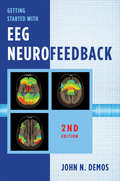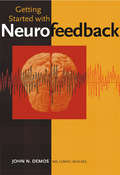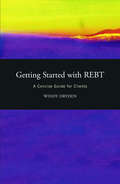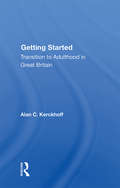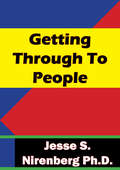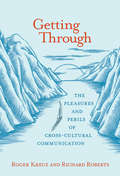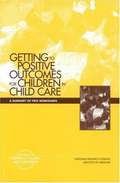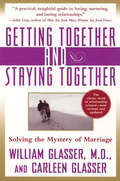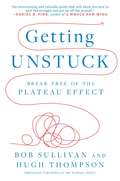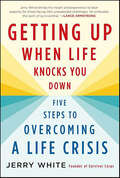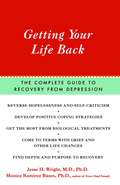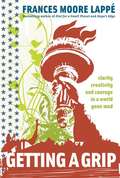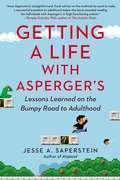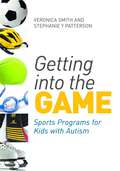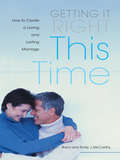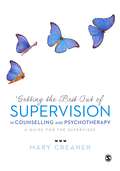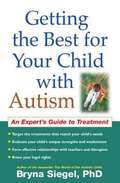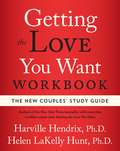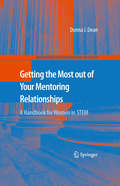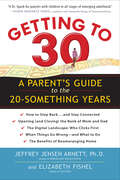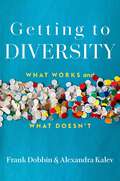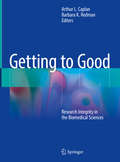- Table View
- List View
Getting Started with EEG Neurofeedback (Second Edition)
by John N. DemosThe long-awaited update to Demos’s classic book for the practitioner looking to add neurofeedback. Neurofeedback training combines the principles of complementary medicine with the power of electronics. This book provides lucid explanations of the mechanisms underlying neurofeedback as well as the research history that led to its implementation. Essential for all clinicians in this field, this book will guide clinicians through the process of diagnosis and treatment.
Getting Started with Neurofeedback
by John N. DemosWhat is neurofeedback? Neurofeedback is founded upon computer technology joined with auxiliary equipment that can measure the metabolic activity of the cerebral cortex. Neurofeedback training combines the principles of complementary medicine with the power of electronics. It is a comprehensive system that promotes growth change at the cellular level of the brain and empowers the client to use his or her mind as a tool for personal healing.Until now, there has not been a single comprehensive yet easy-to-understand guide for clinicians interested in adding neurotherapy to their practice. Getting Started with Neurofeedback is a step-by-step guide for professional health care providers who wish to begin with neurotherapy, as well as experienced clinicians who are looking for a concise treatment guide.This book answers essential questions such as: How does neurotherapy work?, What is the rationale for treatment? When is neurotherapy the treatment of choice? Why should I add it to my already existing healthcare practice? The author also answers questions important to establishing a successful practice such as: What kind of training should clinicians get? What kind of equipment should clinicians buy? How can clinicians add neurofeedback to their existing practice?The first part of the book introduces the reader to the world of neurofeedback, its history and scientific basis. Case studies help clinicians apply what they are learning to their existing practice. Demos takes the mystery out of the assessment process and charts and examples of topographical brain maps (in full color) serve as teaching aids. Later in the book, advanced techniques are explained and demonstrated by additional case studies. The reader is shown how to use biofeedback for the body to augment neurofeedback training as well as being taught to work with the body and acquire a basic knowledge of complementary medicine.The book concludes by offering clinicians practical suggestions on marketing their expanded practice, purchasing equipment, finding appropriate training and supervision, and keeping up with the ever-growing profession of neurofeedback. Research and theory unite to demonstrate the clinical underpinnings for this exciting new modality. Some images in the ebook are not displayed owing to permissions issues.
Getting Started with REBT: A Concise Guide for Clients
by Windy DrydenWhat is Rational Emotive Behaviour Therapy? Rational Emotive Behaviour Therapy (REBT) encourages direct focus on emotional problems, encouraging understanding of the thoughts, beliefs and behaviours that are responsible for maintaining these problems. REBT encourages a healthier outlook by teaching individuals to challenge their irrational thoughts. Getting Started with REBT provides a concise guide to assessing the suitability of REBT and using this method to address your emotional problems. The book is divided into two sections, beginning with an introduction to the theory and practice of REBT that will enable the reader to make an informed decision about whether this method is right for them. The second section guides the reader through issues that are relevant to all emotional problems, demonstrating how to: Formulate emotional problems and set goals Question irrational and rational beliefs Strengthen conviction in rational beliefs Getting Started with REBT is suitable for use either alone or in conjunction with work with an REBT therapist. It will also be of interest to therapists and counsellors.
Getting Started: Transition To Adulthood In Great Britain
by Alan C. KerckhoffThis book provides evidence of the significance of a society's structure and normative definitions in giving shape to one part of the life course, examining closely a major period of life course transition, the move from adolescence to adulthood in Great Britain.
Getting Through To People
by Jesse S. NirenbergIf you think you can't reach all the people all the time - think again! Now you can persuade even the most stubborn or hostile audience to see your point of view with these proven techniques from Dr. Jesse S. Nirenberg. Through dozens of anecdotes, you'll learn how to control conversations with emotional people, how to hold other people's attention, and how to decode what people are really trying to tell you. And you'll discover how to reach the most shy and private people and make them want to open up to you. Getting Through to People invites you to join the over 300,000 people using these powerful methods to break through the mental barriers that obstruct true person-to-person communication, and enhance your personal and business success.-Audio ed.
Getting Through: The Pleasures and Perils of Cross-Cultural Communication (The\mit Press Ser.)
by Richard Roberts Roger KreuzUnderstanding how culture affects the ways we communicate—how we tell jokes, greet, ask questions, hedge, apologize, compliment, and so much more.We can learn to speak other languages, but do we truly understand what we are saying? How much detail should we offer when someone asks how we are? How close should we stand to our conversational partners? Is an invitation genuine or just pro forma? So much of communication depends on culture and context. In Getting Through, Roger Kreuz and Richard Roberts offer a guide to understanding and being understood in different cultures. Drawing on research from psychology, linguistics, sociology, and other fields, as well as personal experience, anecdotes, and popular culture, Kreuz and Roberts describe cross-cultural communication in terms of pragmatics—exploring how language is used and not just what words mean. Sometimes this is easy to figure out. If someone hisses “I'm fine!” though clenched teeth, we can assume that she's not really fine. But sometimes the context, cultural or otherwise, is more nuanced. For example, a visitor from another country might be taken aback when an American offers a complaint (“Cold out today!”) as a greeting. And should you apologize the same way in Tokyo as you would in Toledo? Kreuz and Roberts help us navigate such subtleties. It's a fascinating way to think about human interaction, but it's not purely academic: The more we understand one another, the better we can communicate, and the better we can communicate, the more we can avoid conflict.
Getting To Positive Outcomes For Children In Child Care: A Summary Of Two Workshops
by Board On Children Families YouthA summary on Getting To Positive Outcomes For Children In Child Care
Getting To We
by Kate Vitasek Jeanette Nyden David FrydlingerDrawing on best practices and real examples from companies who are achieving record results, Getting to We flips conventional negotiation on its head, shifting the perspective from a tug of war between parties to a collaborative partnership where both sides effectively pull against a business problem.
Getting Together and Staying Together: Solving the Mystery of Marriage
by William Glasser Carleen GlasserThe facts are nothing short of startling--no matter how many people seem to walk down the aisle, the divorce rate in America is at a record high. What's the secret to getting into a happy marriage and, even more important, staying in one? Now world-renowed psychiatrist Dr. William Glasser and his wife, Carleen Glasser, update their classic guide to successful marriages, Staying Together, for couples young and old. As they examine the questions of why some marriages work and others fail, the Glassers advise readers on how to create loving and happy relationships by applying Dr. Glasser's trademark "choice theory." The result is a wealth of new information about who would make a compatible partner and how to improve any relationship.
Getting Unstuck: Break Free of the Plateau Effect
by Bob Sullivan Hugh ThompsonJust try harder. Just work harder. Just do more. But what happens when working harder doesn't seem to be getting you better results? You've got to get unstuck. In Getting Unstuck, Bob Sullivan and Hugh Thompson show the different kinds of plateaus that can hold you back and how they can be overcome. Using case studies of both success and failure--including Derek Jeter, Blockbuster, and Google--they identify how to avoid pitfalls and to incorporate the peak behaviors that place breakthroughs within anyone's grasp. If you've ever given more and more to a broken relationship, a weight-loss regimen, or a stalled career--only to get less and less in return--Getting Unstuck will change your life.
Getting Up When Life Knocks You Down: Five Steps to Overcoming a Life Crisis
by Jerry WhiteThe loss of a loved one, a bitter divorce, a serious injury or financial crisis—we must all, at some point, face those unavoidable moments that divide our lives into "before" and "after." How do we muscle through tough times and emerge stronger, wiser—even grateful for our struggle? In 1984, author Jerry White lost his leg in a tragic accident. He has personally endured the pain of loss and the challenge of rebuilding. As cofounder of Survivor Corps, White has met thousands of victims of tragedy. With his book Getting Up When Life Knocks You Down, he shares what he has learned.White outlines a specific five-step program for turning tragedy into triumph. In their own words, his survivor friends share their stories. It's a group that includes the well known, like Lance Armstrong, Nelson Mandela, and the late Princess Diana, and also everyday survivors of death, loss, injury and heartbreak. Through their stories and the author's words, this book takes readers step by step through the process of not only surviving tragedy and victimhood, but going on to thrive.
Getting Your Kid on a Gluten-Free Casein-Free Diet
by Susan LordGluten-free casein-free diets are widely used to improve cognitive function, speech patterns, behavior, and general well-being in children on the autistic spectrum. Written by a registered dietician and mother of a child who is thriving on a gluten-free casein-free diet, this practical guide covers everything from how to get your child on the diet, to daily meal plans, recipes and handy shopping lists. Susan Lord offers sound nutritional advice on how to implement the diet correctly, without harming your child by omitting major nutrient groups. Whether you are a parent or care-giver, this book will make removing gluten and casein from an autistic child's diet simple and stress-free. The easy-to-follow meal plans, complete with delicious recipes and ingredient lists, will guide you with confidence in providing a nutritionally-balanced diet for your child, as well as healthy meals the whole family will enjoy.
Getting Your Life Back
by Monica Ramirez Basco Jesse WrightIn this powerful new self-help program, Wright and Basco show you how to blend the best methods of scientifically tested treatments to win the battle against depression. By following their step-by-step instructions, you will be able to develop a Personal Plan for Recovery that you can use to get well and stay well. The flexible plan lets you learn about and master the Five Keys to Recovery in the sequence that's best for you. Some people may want to work through all five keys; others may find they are able to achieve the level of health they want with just a few. Whether you learn the self-help strategies of cognitive-behavior therapy, rely on prescription antidepressants, try herbal remedies, work on mending relationships, focus on spiritual growth, or use a combination of methods, the Personal Plan for Recovery is a breakthrough tool that allows you to take control of your own treatment. Conversational and filled with guided exercises and strategies that work, Getting Your Life Back is an empowering book that maximizes each person's strengths and potential.
Getting a Grip: Clarity, Creativity, and Courage in a World Gone Mad
by Frances Moore LappeThe author breaks the conventions by interweaving fresh insights, startling facts, and stirring vignette of ordinary people pursuing creative solutions to the most pressing global problems.
Getting a Life with Asperger's
by Jesse A. SapersteinHard-won insights on transitioning into adulthood Author, speaker, and autism advocate Jesse A. Saperstein knows a lot about living with Asperger's. Diagnosed at the age of 14, Jesse has struggled, triumphed, flubbed, soared, educated, and inspired. Along the road to adulthood, he has learned many lessons the hard way. In this honest and engaging book, he offers a guided tour of what he's learned about getting along with others, managing emotions, succeeding in school and work, building relationships, and more. Among his Asperger's Rules are: Clean Up Your Own Mess (including but not limited to credit card debt, out-of-control collections, and your cesspool of a room) You Can't Bail Out the Titanic with a Wine Glass (or change the world of online dating) Serving as a Role Model to the Next Generation of Asperger's Syndrome Navigating the challenges of college and the unrelenting storm of transition. The Road to Catastrophe is Paved with Good Intentions (understanding how others perceive you, even if they're wrong) WIN (Work Is Necessary) You are talented enough to maintain employment even if your options are not ideal Confronting Memories of Bullying and Showing Mercy toward Yourself Heartfelt, insightful, and generous, this book will enlighten and inform readers, whether they are on the autism spectrum or not.
Getting from College to Career Third Edition: Your Essential Guide to Succeeding in the Real World
by Lindsey PollakThe third edition of the essential guide for college students and recent graduates to help you prepare for starting your career—now revised and updated for Gen Z to reflect the realities of the current job marketHow do you get a job without experience and get experience without a job? It’s the question virtually every college student and recent graduate faces. With the rise of hybrid work, advances in artificial intelligence, and ever-shifting economic circumstances, the situation for aspiring Gen Z professionals has never been more challenging. But there is help. Getting from College to Career is the definitive guide to building the experience, skills, and confidence you need to tackle today’s fast-moving job search, offering action-oriented tips and strategies ranging from the simple to the expert. Revised with new material, this third edition includes up-to-date advice on how to:Use the best digital and mobile tools— including AI—for career prep and job hunting E-mail, text, and Zoom like a professional Interview in person and virtually Reskill and upskill for “jobs of the future” Manage your mental health through career ups and downs And moreGetting from College to Career gives you the cutting-edge information and guidance you need to get your foot in the door of the real world. Don’t start your first job search without it!
Getting into the Game: Sports Programs for Kids with Autism
by Veronica Smith Shafali Spurling Jeste Stephanie Patterson Janine Halayko Richard K. Spurling Jonathan Rivero Vivian Ng Connie Kasari Laura DumasGetting into the Game: Sports Programs for Kids with Autism Spectrum Disorder will help families, clinicians and coaches support children with autism in taking their first steps into sport and recreation. Participation in individual and team sports plays an important part in children's development and promotes growth in a number of areas. As well as the obvious health benefits, sport also provides the perfect backdrop to teach young people with autism about rules, strategy and teamwork - all invaluable lessons that can be applied to wider society. By detailing six of the most popular sports: cycling, ice skating, swimming, soccer, taekwondo and tennis and including the unique experiences of families of children with autism, it offers all the information, advice and support needed to help get kids with autism engaged in fun and positive sport environments. This book is an invaluable resource for parents, teachers, coaches and anyone supporting children with autism spectrum disorders in a sport or recreation environment.
Getting it Right This Time: How to Create a Loving and Lasting Marriage
by Barry W. McCarthy Emily J. McCarthyAlthough divorce is common, it often holds negative associations. Husband and wife team Barry and Emily McCarthy view divorce and remarriage with optimism, showing it to be a courageous choice that should not be viewed as personal failure but rather as a positive step towards a better life. In Getting it Right This Time, they zoom in on remarriage issues and identify the factors that led to the end of a marriage, using that information to help you learn from past mistakes and start over. Marriage is based on a respectful, trusting relationship, and the McCarthys affirm that remarriage is an important choice that can lead to a rich, rewarding, and loving second chance. Getting it Right This Time provides resources needed to assess and change attitudes, behavior, and feelings to help you build a new marriage and step-family that will bring out the best in you as individuals and as a couple.
Getting the Best Out of Supervision in Counselling & Psychotherapy: A Guide for the Supervisee
by Dr Mary CreanerGetting the Best Out of Supervision in Counselling & Psychotherapy does exactly what it says on the tin! Supervision is an essential part of counselling training and ensuring you know exactly how to get the very most out of supervision is important, whatever their level of study. Exploring how to begin, maintain and end a supervisory learning relationship in the context of existing theory and best practice guidelines, the author will introduce your trainees to: Models and forms of supervision The skills informing good supervision What to expect from supervision Key professional issues in supervision ? Written in a lively and engaging style, this book will enable both supervisors and supervisees to get the best they can from the supervisory experience.
Getting the Best for Your Child with Autism
by Bryna SiegelAs the parent of a child with an autism spectrum disorder, you need an informed, caring advocate who can deftly guide you through the complex maze of treatment options. In this empowering resource, bestselling author Bryna Siegel--one of the world's leading authorities on the disorder--helps you zero in on proven strategies and tailor them to fit your child's unique needs. Like no other book, Getting the Best for Your Child with Autism shows how to get an accurate assessment of your child's strengths and weaknesses so you can develop a plan of action suited to his or her individual learning style, interests, verbal abilities, and social skills. You'll learn what services you're entitled to, how to determine what's right for your family, and ways to work effectively with doctors and school professionals. With Dr. Siegel as your ally, you can help your child learn and grow.
Getting the Love You Want Workbook: The New Couples' Study Guide
by Harville Hendrix Helen LaKelly HuntThis newly revised and updated companion study guide to the 2019 edition of the New York Times bestseller Getting the Love You Want.In 1988, Harville Hendrix, in partnership with his wife, Helen LaKelly Hunt, published a terrifically successful relationship guide called Getting the Love You Want. The book introduced thousands to their Imago Relationship Therapy, a unique healing process for couples, prospective couples, and parents, and developed into an overnight sensation. For their part, Doctors Hendrix and Hunt managed to aid scores of couples in their plight for more loving, supportive, and deeply satisfying relationships. Now, more than a decade later, this companion book picks up where its predecessor left off, delving further into relationship therapy to help transform relationships into lasting sources of love and companionship. The Getting the Love You Want Workbook is designed for the hundreds of thousands of couples who have attended Imago workshops since Getting the Love You Want hit bookstands, as well as new and curious ones seeking a practical route back to intimacy and passionate friendship. The workbook contains a unique twelve-week course (The New Couples&’ Study Guide) designed to help work through the exercises published in Part III of Getting the Love You Want. For those of us struggling to maintain our most precious relationships, the Getting the Love You Want Workbook helps us grow aware of our individual, unconscious agenda while steering us towards a more harmonious link with our loved ones that will satisfy our deepest needs.
Getting the Most out of Your Mentoring Relationships
by Donna J. DeanTraditionally, scientific research in all disciplines has demanded single-mindedness, exclusive devotion, and aggressive self-promotion. The image of the scientist in the laboratory at all hours of the night and weekend is not far from the reality sometimes demanded. Because of the structure of the science, technology, engineering, and mathematics (STEM) curricula and workplace environment, women often work up to 80 hours per week with little time for outside pursuits - let alone extracurricular reading. Yet, precisely because of these demands, it is imperative that they build solid mentoring relationships. This handbook aims to provide a quick, yet structured guide to mentoring including finding the right mentors, being a good mentee, and making the most out of today's diverse mentoring environments. A handy resource guide will be included for quick reference.
Getting to 30: A Parent's Guide to the 20-Something Years
by Elizabeth Fishel Jeffrey Jensen Arnett“This is the book parents have been waiting for”—Michael Thompson, coauthor of Raising Cain. The book that is “helpful, hopeful, and engaging”—Jeanne Brooks-Gunn, Ph.D., Columbia University. It is the book that addresses the new reality for parents of kids in their 20s and the issues that everyone in the media is talking about: When will this new generation of 20-somethings leave home, find love, start a career, settle down—grow up? And it's the book that will soothe your nerves. It’s loaded with information about what to expect and guidance on what to do when problems arise (as they probably will). In other words, this is the book parents need—Getting to 30, by Jeffrey Jensen Arnett, the world's leading authority on the post-adolescent phase he named emerging adulthood, and Elizabeth Fishel, author of Sisters and other books. As Getting to 30 shows, the road to adulthood is longer than we think—and, for parents, bumpier. It explains what’s really happening to your 18- to 29-year-old, including the story behind your child’s moods. The phenomenon of the boomerang child—and why it’s actually a good thing, for parents and kids. The new landscape of 20-something romance. And it gives all the tools parents need to deal with the challenges, from six ways to listen more than you talk, to knowing when to open (and close) the Bank of Mom and Dad while saving for retirement, to figuring out the protocol for social media. Published in hardcover as When Will My Grown-Up Kid Grow Up?, Getting to 30 includes the latest research on the optimistic and supportive attitude most parents have regarding their 20-something children.
Getting to Diversity: What Works and What Doesn’t
by Frank Dobbin Alexandra Kalev“Too many companies don’t know how to walk the walk of diversity, equity, and inclusion. Getting to Diversity shows them how.”—Lori George Billingsley, former Global Chief DEI Officer, Coca-Cola CompanyIn an authoritative, data-driven account, two of the world’s leading management experts challenge dominant approaches to increasing workplace diversity and provide a comprehensive account of what really works.Every year America becomes more diverse, but change in the makeup of the management ranks has stalled. The problem has become an urgent matter of national debate. How do we fix it? Bestselling books preach moral reformation. Employers, however well intentioned, follow guesswork and whatever their peers happen to be doing. Arguing that it’s time to focus on changing systems rather than individuals, two of the world’s leading experts on workplace diversity show us a better way in the first comprehensive, data-driven analysis of what succeeds and what fails. The surprising results will change how America works.Frank Dobbin and Alexandra Kalev draw on more than thirty years of data from eight hundred companies as well as in-depth interviews with managers. The research shows just how little companies gain from standard practice: sending managers to diversity training to reveal their biases, then following up with hiring and promotion rules, and sanctions, to shape their behavior. Almost nothing changes. It’s time, Dobbin and Kalev argue, to focus on changing the management systems that make it hard for women and people of color to succeed. They show us how the best firms are pioneering new recruitment, mentoring, and skill training systems, and implementing strategies for mixing segregated work groups to increase diversity. They explain what a difference ambitious work–life programs make. And they argue that as firms adopt new systems, the key to making them work is to make them accessible to all—not just the favored few.Powerful, authoritative, and driven by a commitment to change, Getting to Diversity is the book we need now to address constructively one of the most fraught challenges in American life.
Getting to Good: Research Integrity In The Biomedical Sciences
by Barbara K. Redman Arthur L. CaplanThis book represents the first comprehensive, gold standard reader on research integrity in the biomedical sciences. Now more than ever, the responsible conduct of research (RCR) has become critically important as new technologies affect research practices in both positive and negative ways. Since learning to do science and practicing it brings researchers into contact with a vast array of ethical issues, it is critical to know the standards and how they are evolving. Indeed, research integrity requires scientists at all levels to operate ethically in a system that supports ethical practice. This unique, foundational text covers all the relevant areas -- subject protection, research misconduct and conflict of interest as well as newly quantified concerns about research bias and non-reproducibility, as well as other unique issues. Developed by renowned experts, this compelling title discusses the full range of practices and policies that should support research that is honestly produced and disseminated. It also specifically incorporates topics noted by the National Institutes of Health as essential and required for training in RCR. Getting to Good – Research Integrity in the Biomedical Sciences is a major contribution to the literature on bioethics and will serve as an invaluable resource for all researchers, students, administrators and professionals interested in research ethics and integrity.
